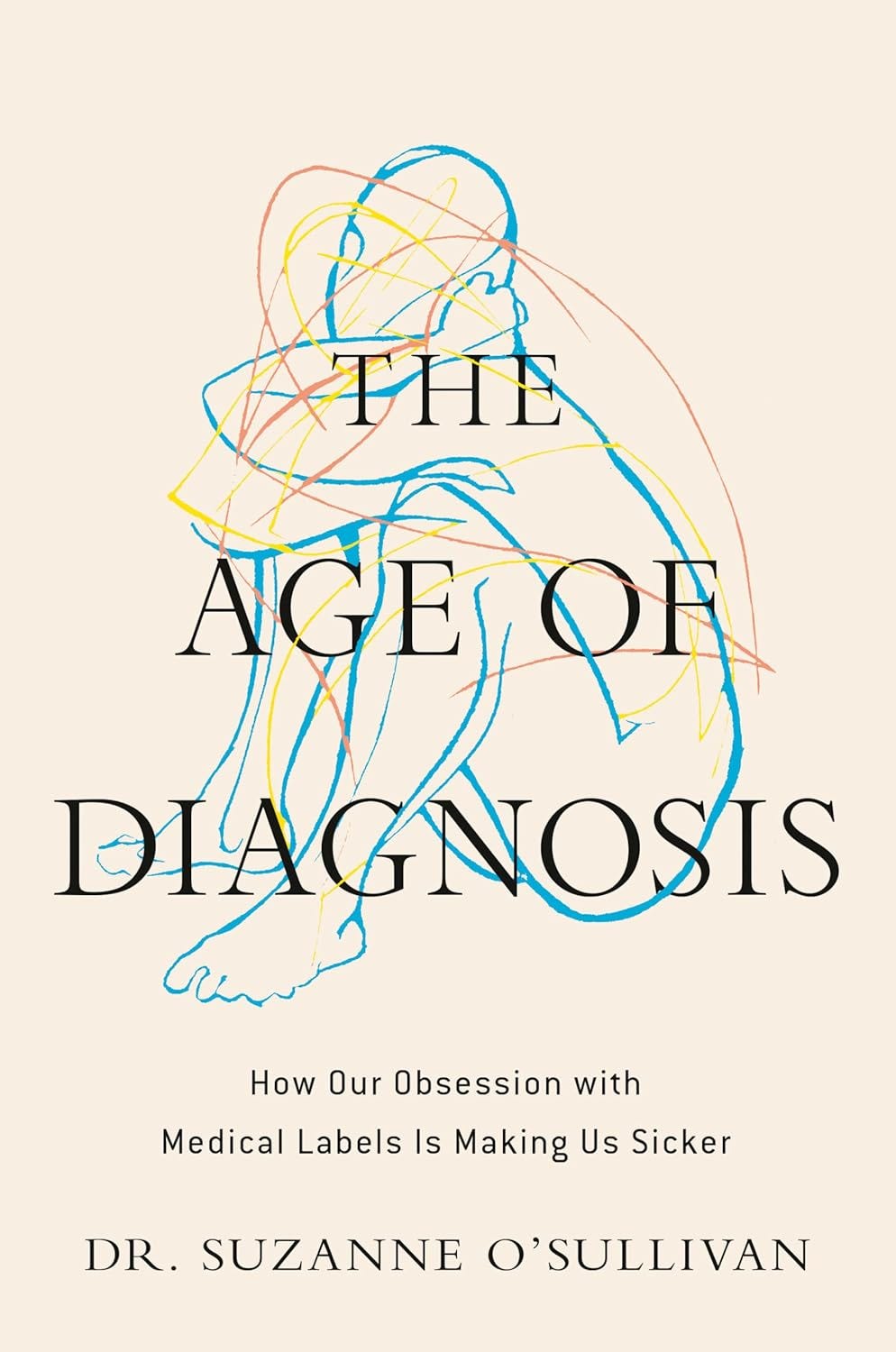Review of AGE OF DIAGNOSIS
Are we too obsessed with diagnosing everything that is “wrong” with us?
Tl;dr – A good, easy, and timely read on the problem of overdiagnosis and overmedicalization. Bold arguments, good evidence, and intimate interviews. A solid addition to your TBR for those interested in heterodox takes on current affairs.
If you spend any time online these days, you may have noticed that everyone seems to have something wrong with them. Some sort of diagnosis. ADHD, autism, long covid. Some people’s bios have literal lists of medical and psychiatric conditions. Is this normal? To be so abnormal?
Dr. Suzanne O’Sullivan noticed this trend in her practice. She saw more and more new patients, especially young ones, over the years coming into her clinical neurology practice with long lists of diagnoses and medical labels. In Age of Diagnosis: How Our Obsession with Medical Labels is Making Us Sicker, O’Sullivan questions whether our increased use of genetic screening technologies, expanding diagnostic criteria, and pathologizing normal variation is making us worse off.
The book focuses on two phenomena, overdiagnosis and overmedicalization, to challenge several common assumptions:
that any diagnosis is better than no diagnosis; that test s are more accurate than doctors; that test results are objective, immutable truths; that early intervention is always for the best that treatments that work for one set of people will work equally well for others; that diagnosis is something fixed and definite; that preemptive testing is the surest way to long-term health; that more knowledge is always for the best.
She approaches the book with a handful of illustrative diagnoses across the chapters. She uses Huntington’s Disease to show how early detection – of which for this disease is a clear diagnosis with a 100% chance of disease – through genetic testing is not always wanted or helpful to those at risk of the disease. Lyme Disease and Long Covid exemplify the modern phenomena of patient-created diseases with an array of non-specific symptoms that is probably overmedicalizing normal things; autism, ADHD, and depression are various examples of how disorders become so inclusive that they trivialize the experience of those with severe medical needs; and genetic breast cancer as an example of how probabilistic screening can lead to unnecessary medical care.
O’Sullivan argues that much of what is happening may be a result of psychosomatic self-fulfilling prophecies of sorts. We pathologize the normal, encourage people to seek out medical attentional for something they didn’t focus on before; then the hyper-focus on symptoms causes people to notice normal things they hadn’t before or wouldn’t have otherwise and, in extreme cases, can then create new or worsening symptoms. We may literally be making ourselves sicker by trying to cure and screen ourselves of all ills.
There are many, many people with genuine problems in need of medical care and accommodations. When people who have normal variation and not abnormal disorders take up those resources because of unneeded and unnecessary medical diagnoses, they take away care and resources from those who actually benefit from them.
It's a bold book. But one that is necessary. Though she doesn’t touch on it in this book, the laundry list of medical labels sought by people with psychosomatic symptoms or normal variation of physiological functioning is almost certainly part of the larger identity politics of the modern age as well. You’d be hard pressed to meet someone off the street that doesn’t have some medical diagnosis of some problem. I found this to be a good and easy read. A timely one too given how over medicalized everything is now.
Reader poll
Published: March 2025
Publisher: Thesis
Format: Hardcover (gifted by publisher)
If you think this sounds interesting, bookmark these other great reads:
DSM: A History of Psychiatry's Bible (2021) by Allan V. Horwitz
Good Reasons for Bad Feelings: Insights from the Frontier of Evolutionary Psychiatry (2019) by Randolph M. Nesse
The Gospel of Wellness: Gyms, Gurus, Goop, and the False Promise of Self-Care (2022) by Rina Raphael | Read my review
You might also like…
Review of THE GOSPEL OF WELLNESS
Tl;dr – This is an excellent analysis of not just the wellness industry – which is what I was expecting – but also the sociology and psychology of why it’s taken off, and specifically why women are the wellness industry’s primary consumers. A deep, engaging read. Highly recommend.








Hey, it's not my personality, I'm nuerodivergent !
O’Sullivan makes some relatively useful observations. I think both her argument and the realization that people are systemically disenfranchised from the healthcare system and medical diagnosis process. It seems paradoxical that both may be true- but I think the difficulty with complex systems.